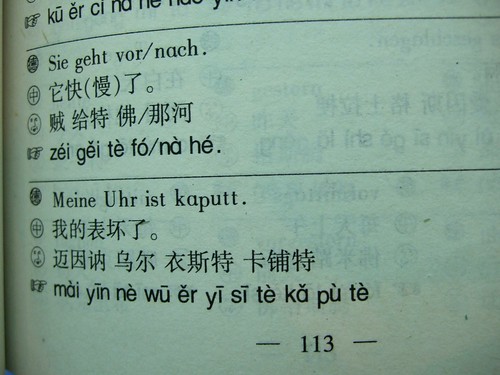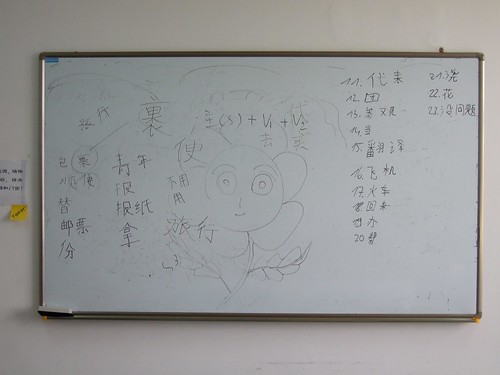Chinese | Dominik Mayer – Products, Asia, Productivity
Doing and Sitting
John Pasden at Sinosplice shares this cute conversation between a bilingual kid in the US and a Chinese adult:
Adult: 你最喜欢跟家人做什么?
Child: 椅子。
In English:
Adult: What do you most like doing with your family?
Child: Chair.
John explains:
The key to understanding this exchange is knowing that 做 (zuò), the verb meaning “to do,” sounds identical to the verb 坐 (zuò), which means “to sit.” Add into this that many verbs in Chinese don’t require an additional preposition like their English counterparts (for example, we’d say “sit on” rather than just “sit”), and the child’s answer starts to make a lot of sense.
Great example of the challenges understanding spoken Chinese. Using characters this mixup could never happen.
Then enter Vietnamese, where even in the written language everything looks the same:
Chào em = Hello
Cháo em = You porridge
Tones and Humidity
The Max Planck Society:
Their study has revealed that languages with a wide range of tone pitches are more prevalent in regions with high humidity levels. In contrast, languages with simpler tone pitches are mainly found in drier regions. This is explained by the fact that the vocal folds require a humid environment to produce the right tone.
I’m from a very non-humid climate. Maybe that’s the reason why it’s so hard for me to learn Vietnamese…
How to Choose a Chinese Name
Sinosplice founder John Pasden:
Should learners of Chinese have a Chinese name? That’s a good question, but it’s not one that I’ll be answering in this article. Assuming that you feel you need a Chinese name, there are several approaches that you can take, depending on your preferences and your needs.
I got my Chinese name assigned when I enrolled in Tongji University.
Last Exams
Less then one week until the first of my last exams here at Tongji University. So many things I’ve learned in the past year.
Back to work. Let’s study more words that a China-born friend, who has been living here for eight years, doesn’t know… ;-)
Intermediate?
Buying books for my third and last semester at Tongji. They have strange titles. The most important one: “Climbing up”. And no “Elementary Chinese” next semester. Now it’s called “Intermediate Chinese”. I’m afraid.
What's Really Important
I passed my first exam today. But it means more to me that I could read and sing some Chinese songs at KTV this evening.
Update
Ubuntu 8.04 brought me Firefox 3 Beta 5 which is not yet supported by one of my crucial add-ons. Chinese Perapera-kun translates Chinese words by hovering over them. Very useful.
Now I have to get along with these:
- Chinaboard: Translates whole expressions
- Google Translate: Not very accurate but provides a rough overview
- dict.leo.org: German/Chinese and Pinyin
- Dict.cn: English/Chinese
Teamwork
The midterms are over and learning for them has improved my Chinese quite a bit. Inspired by a student of Sinology I had decided not to study any tones as memorizing doesn’t work, I can’t speak them anyway and most Chinese also understand me if I don’t use them. That doesn’t mean that I won’t try to learn them by speaking.
In the midterms we solved some exercises in teamwork and I would have never thought that one day a Chinese would copy from me in a Chinese exam. ;-)
German Pinyin
What would it look like if you’d try to write German pronunciation in pinyin?


To all Chinese that think it’s a great idea: Germans most likely won’t understand.
Writing Hanzi

A Kazakh classmate and I had to write the hanzi for the new lesson on the whiteboard. With the help of the book, so it wasn’t too difficult.

The result.

Only one minor correction on my side.

The horizontal stroke at the first character of number eleven was wrongly inclined.
Hanzi He Fayin
Chinese test tomorrow morning, I’m learning hanzi. It’s impossible. I can mostly recognize and read them and if I see one I know how to write it. But if I shall write one with given pinyin or on my own I’m totally lost.
And I still can’t memorize the tones, not to mention that even if I know the right ones I’m unable to pronounce them. Instead of “two yuan” (liǎng kuài) I say “cold weather” (liáng kuài) and my noodles (miàntiáo) tend to become sanitary napkins (miántiáo).
Artifical Language
Why don’t I learn Lojban. Seems to be so much easier than Chinese.
Like Women
A Chinese friend asked how many female teachers we have (three out of four), said we’d sound like women rather then men when we speak Chinese. Alarming.